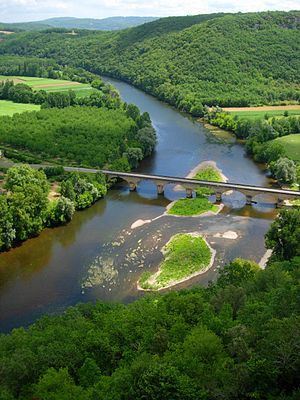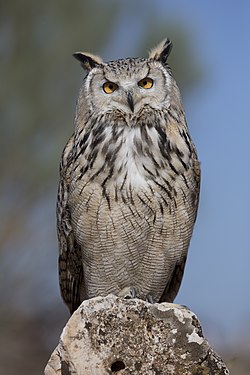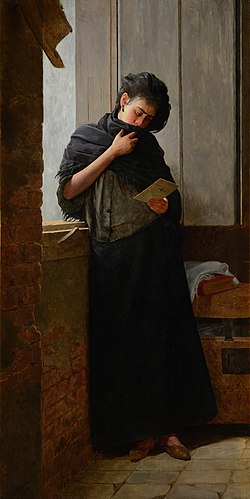|
Featured picture tools: |
These featured pictures, as scheduled below, appeared as the picture of the day (POTD) on the English Wikipedia's Main Page in February 2017. Individual sections for each day on this page can be linked to with the day number as the anchor name (e.g. [[Wikipedia:Picture of the day/February 2017#1]] for February 1).
You can add an automatically updating POTD template to your user page using {{Pic of the day}} (version with blurb) or {{POTD}} (version without blurb). For instructions on how to make custom POTD layouts, see Wikipedia:Picture of the day.Purge server cache
February 1

|
The Dordogne is a river in south-central and southwest France, shown here in Périgord, near Castelnaud-la-Chapelle. It flows from Puy de Sancy generally west about 500 kilometres (310 mi) through the Limousin and Périgord regions before flowing into the Gironde in the north of the city of Bordeaux. The Dordogne and its watershed have been designated a biosphere reserve by UNESCO. Photograph: Luc Viatour |
February 2

|
The Eurasian eagle-owl (Bubo bubo) is one of the largest species of owl and one of the most widely distributed, being found throughout much of Europe and Asia. It is easily identified thanks to its distinctive ear tufts and orange eyes. The Eurasian eagle-owl is found in a number of habitats but is mostly a bird of mountain regions, coniferous forests, steppes and other relatively remote places. Photograph: Carlos Delgado
Recently featured:
|
February 3

|
Charles de Solier, comte de Morette was a French soldier and diplomat as well as a long-serving gentilhomme de la chambre to King Francis I. He was in London in 1534 as France's ambassador when Henry VIII was attempting to win French support for his repudiation of Catherine of Aragon, in an alliance against Charles V. Around this time, this portrait was painted. Painting: Hans Holbein the Younger
Recently featured:
|
February 4

|
The Saalfeld Fairy Grottoes are caverns or grottoes of a former mine in near Saalfeld, in the German state of Thuringia. They have long been famous for their countless colorful mineral formations (speleothems) formed over many years by water dripping through relatively soft rock. Since 1993, the Guinness Book of World Records has termed the Feengrotten "the most colorful cave grottoes in the world." Photograph: Ansgar Koreng
Recently featured:
|
February 5

|
Beauty Revealed is an 1828 self-portrait by Sarah Goodridge (1788–1853), painted in miniature with watercolors on a piece of ivory. Depicting the artist's bared breasts surrounded by pale cloth, the 6.7-by-8-centimetre (2.6 by 3.1 in) painting was gifted to statesman Daniel Webster, who was a frequent subject and possibly a lover, following the death of his wife.
Recently featured:
|
February 6

|
The nave of the Cathedral Church of St Thomas of Canterbury in Portsmouth, England. The original building was dedicated in 1188 to the honour of St Thomas of Canterbury, who was assassinated and martyred. This chapel was to become, in turn, a parish church in the 14th century and a cathedral in the 20th century. Photograph: David Iliff
Recently featured:
|
February 7

|
The Magpie, by the French Impressionist Claude Monet, is one of approximately 140 snowscapes produced by Monet and is his largest winter painting. It depicts a solitary black-and-white magpie perched on a gate formed in a wattle fence, as the light of the sun shines upon freshly fallen snow creating blue shadows. Painting: Claude Monet
Recently featured:
|
February 8

|
Oenothera biennis is a plant native to eastern and central North America and widely naturalized elsewhere in temperate and subtropical regions. It has a life span of two years, growing to 30–150 cm (10–60 in) tall. The flowers are yellow and only last until the following noon after blooming. They open visibly fast every evening producing an interesting spectacle, hence the common name "evening primrose." Photograph: George Chernilevsky
Recently featured:
|
February 9

|
George W. Campbell (1769–1848) was an American statesman who served as a U.S. Representative, Senator, Tennessee Supreme Court Justice, and U.S. Ambassador to Russia. Appointed fifth United States Secretary of the Treasury by James Madison, he faced national financial disorder brought on by the War of 1812. Campbell was unsuccessful in his efforts to raise enough money through government bond sales and he resigned after only eight months in office, disillusioned and in bad health. Engraving: Bureau of Engraving and Printing; restoration: Andrew Shiva
Recently featured:
|
February 10

|
Paul Fildes (1882–1971) was a British pathologist and microbiologist who worked at Porton Down during the Second World War. He was involved in anthrax strain tests on Gruinard Island and claimed to have assisted with the assassination of the Nazi Reinhard Heydrich. Painting: Luke Fildes
Recently featured:
|
February 11
|
Wind tests being conducted on a volunteer at the Langley Research Center in 1946. In these tests, under the guidance of the National Advisory Committee for Aeronautics and at the request of the United States Navy, the volunteer was subjected to wind speeds reaching a maximum of 457 mph (735 km/h); local wind speeds along the subject's face reached 720 mph (1,160 km/h)). These tests were intended to measure the effects of bailing out of a high-speed aircraft on the human body. They showed that "effects of the wind stream on clothing and gear were in many ways more pronounced than on the subject. Even at low speeds, loose clothing flapped and fluttered violently. The helmet and chin strap needed constant readjustment, and the helmet's seams began to tear during exposures to 400-mile-an-hour winds." Video: National Advisory Committee for Aeronautics
Recently featured:
|
February 12

|
|
Shrovetide by the Russian artist Boris Kustodiev (1878–1927). This 1916 painting depicts Maslenitsa, or the last week of Shrovetide, as remembered by the artist. Painting: Boris Kustodiev
Recently featured:
|
February 13

|
Clanculus corallinus is a species of sea snail in the family Trochidae. First described in 1791, this species has a umbilicate shell that is globose-conic in shape. Though often coral-red or brown, it may show considerable variation in color. Photograph: H. Zell
Recently featured:
|
February 14

|
Saudade, an oil on canvas painting completed in 1899 by José Ferraz de Almeida Júnior. The Portuguese word saudade refers to a deep emotional state of nostalgic or profound melancholic longing for a beloved, and often connotes a repressed knowledge that the object of longing might never return. Once described as "the love that remains" after someone is gone, saudade now refers to a sense that someone or something that should be present is missing. Painting: José Ferraz de Almeida Júnior
Recently featured:
|
February 15

|
The inlet at Fort Pierce, a city of nearly 43,000 in Florida. The area around the inlet is Fort Pierce Inlet State Park, which consists of beaches, dunes and a coastal hammock between the Atlantic Ocean and the waters of Tucker Cove. Photograph: Don Ramey Logan Jr.
Recently featured:
|
February 16

|
L'éclair is an opéra comique in three acts by Fromental Halévy to a libretto by Jules-Henri Vernoy de Saint-Georges. Premiered by the Paris Opéra-Comique at the Salle de la Bourse on 16 December 1835, the opera was well received. It follows the amours of the Englishman George and the American Lyonel for two sisters, the bachelorette Henriette and the widow Mme. Darbel. Illustration: Paul Gavarni; restoration: Adam Cuerden
Recently featured:
|
February 17

|
The Rocket is an oil painting on canvas completed in 1909 by the American artist Edward Middleton Manigault. It depicts a fireworks display over the Hudson River, as well as a boat full of spectators. The work is now held in the Columbus Museum of Art. Painting: Edward Middleton Manigault
Recently featured:
|
February 18

|
The PlayStation 4 is a home video game console developed by Sony Computer Entertainment. Released in 2013, it competes with Nintendo's Wii U and Microsoft's Xbox One, as part of the eighth generation of video game consoles. The console, which features an AMD Accelerated Processing Unit built upon the x86-64 architecture, places emphasis on social interaction and integration with other devices and services. The console was positively received, and by the end of 2016 more than 53 million consoles had been sold. Photograph: Evan Amos
Recently featured:
|
February 19

|
A sailing yacht is a leisure boat that uses sails as its primary means of propulsion. Sailing yachts are actively used in sport and are a category of classes recognized by the International Sailing Federation. Shown here is the Zapata II, built in 1964, during the 2013 Ahmanson Cup in Newport Beach, California. Photograph: Don Ramey Logan Jr.
Recently featured:
|
February 20

|
Öxarárfoss is a 20 metres (66 ft)-high waterfall in Þingvellir National Park, Iceland. It flows from the river Öxará over the Almannagjá and is one of the main attractions in the park. Photograph: Diego Delso
Recently featured:
|
February 21

|
Men of the Docks is an oil painting on canvas completed by the American artist George Bellows in 1912. Depicting day laborers at the docks of New York City, this 114.3 by 161.3 cm (45.0 by 63.5 in) painting was sold to the National Gallery in London in 2014 for $25.5 million. Painting: George Bellows
Recently featured:
|
February 22

|
A Lufthansa Airbus A320-211 taking off at Stuttgart Airport, Germany. The Airbus A320 family, consisting of the A318, A319, A320, and A321, pioneered the use of digital fly-by-wire flight control systems and side-stick controls in commercial aircraft. Since the 1980s, a total of 7,442 Airbus A320-family aircraft have been delivered, of which 7,122 are in service. The largest A320 fleet is that of American Airlines, with 380 aircraft. Photograph: Julian Herzog
Recently featured:
|
February 23

|
La Mousmé is an oil painting on canvas completed by Vincent van Gogh in 1888. Inspired by Pierre Loti's novel Madame Chrysanthème and Japanese artwork, it depicts what van Gogh called "a Japanese girl—Provençal in this case—twelve to fourteen years old." She wears an outfit from the Arles region of southern France, and her coloration is that of a girl from the region, but with a Japanese influence. The painting is now held by the National Gallery of Art in Washington, D.C. Painting: Vincent van Gogh
Recently featured:
|
February 24

|
Durbar Court at the Foreign and Commonwealth Office, the department of the Government of the United Kingdom that is responsible for protecting and promoting British interests worldwide. It was created in 1968 by merging the Foreign Office and the Commonwealth Office. Photograph: Colin
Recently featured:
|
February 25

|
|
A photographic triptych showing seed dispersal from the seed heads of a great willowherb. As plants have very limited mobility, they rely upon a variety of dispersal vectors to transport their seeds. Seeds may be dispersed individually or collectively. Some plants are serotinous and only disperse their seeds in response to an environmental stimulus. There are five main modes of seed dispersal: gravity, wind, ballistic, water, and animals. Photograph: Colin
Recently featured:
|
February 26

|
The interior of St James's Church, Spanish Place, a large English Gothic Roman Catholic church in Marylebone, London. Although currently situated in George Street, the church maintains its connection with Spanish Place, the road opposite the current church, because of its historic connection with the Spanish Embassy. It is grade II* listed with Historic England. Photograph: David Iliff |
February 27

|
Ellen Terry (1847–1928) was an English actress who became the leading Shakespearean actress in Britain. Born into a family of actors, she began performing as a child and toured widely in Britain in her teens. Among other comic and dramatic roles, she gained fame for her portrayals of Portia in The Merchant of Venice and Beatrice in Much Ado About Nothing, opposite Henry Irving, both in Britain and America. She later managed the Imperial Theatre in London, lectured, and continued to act until 1922. Photograph: Julia Margaret Cameron |
February 28

|
A dancer from Sanata Dharma University's Balinese dance group performing kebyar duduk, a dance created by I Mario and first performed in 1925. Inspired by the development of the quick-paced gamelan gong kebyar, kebyar duduk is named for the seated and half-seated positions taken by the dancers. While in this position, dancers may shift or spin around, using their eyes to emote. Unlike several other Balinese dances, kebyar duduk is interpretative rather than narrative. Photograph: Chris Woodrich
Recently featured:
|
Picture of the day archives and future dates